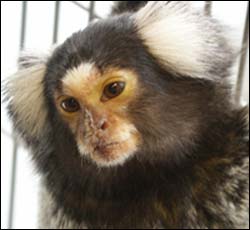For two primates, patience takes different forms, shaped by ecology

Credit: Jeff Stevens
Across the animal kingdom, individuals face choices between patience and impulsivity. A classic case, confronted by all animals–humans included–is that between a small, immediate food reward and a delayed, but larger, reward. In such cases, impulsivity typically trumps patience as individuals fail to delay gratification. But what factors influence these decisions? Researchers have gained new insight into this question by showing that the particular ways in which animals exhibit patience and impulsivity differ from one context to another and may be closely related to the animals’ ecological niches and their everyday interactions with the natural world.
Comparing two monkey species with very different food-gathering strategies, the researchers show that the species exhibit differing propensities toward patience and impulsivity, depending on the context of the choice being made–for example, whether the trade-off for reward is temporal (waiting for a reward) or spatial (traveling for a reward). The work is reported by Jeffrey Stevens, Marc Hauser, and colleagues at Harvard University.
Earlier work by others had demonstrated that two species of New World monkeys–cotton-top tamarins (Saguinus oedipus) and common marmosets (Callithrix jacchus)–behave impulsively, only waiting between eight and twenty seconds to receive a threefold increase in food reward. Those results also showed a significant species difference: Marmosets waited almost twice as long as tamarins for the larger reward. This pattern is consistent with each species’ foraging adaptations: Marmosets primarily feed on tree exudates, a food that requires the patience to wait for sap to exude, whereas tamarins feed on insects, a food that requires quick, impulsive action. Yet it had been unclear whether this impulsivity depended on context.
In the new work, the researchers tested whether these same two monkey species act impulsively “over space” as well as over time. The scientists found that when faced with a choice between a smaller, nearby reward and a larger, more distant reward, tamarins were willing to travel farther than marmosets–therefore, tamarins act more impulsively over time, but marmosets act more impulsively over space. Like the temporal impulsivity data, the new findings parallel details of each species’ ecology. Tamarins range over large distances to feed on insects, whereas marmosets range over shorter distances to feed on tree exudates, a clumped resource. These results show that impulsivity is context specific, shaped by a history of ecological pressures.
Media Contact
More Information:
http://www.current-biology.comAll latest news from the category: Ecology, The Environment and Conservation
This complex theme deals primarily with interactions between organisms and the environmental factors that impact them, but to a greater extent between individual inanimate environmental factors.
innovations-report offers informative reports and articles on topics such as climate protection, landscape conservation, ecological systems, wildlife and nature parks and ecosystem efficiency and balance.
Newest articles

Sea slugs inspire highly stretchable biomedical sensor
USC Viterbi School of Engineering researcher Hangbo Zhao presents findings on highly stretchable and customizable microneedles for application in fields including neuroscience, tissue engineering, and wearable bioelectronics. The revolution in…

Twisting and binding matter waves with photons in a cavity
Precisely measuring the energy states of individual atoms has been a historical challenge for physicists due to atomic recoil. When an atom interacts with a photon, the atom “recoils” in…

Nanotubes, nanoparticles, and antibodies detect tiny amounts of fentanyl
New sensor is six orders of magnitude more sensitive than the next best thing. A research team at Pitt led by Alexander Star, a chemistry professor in the Kenneth P. Dietrich…





















